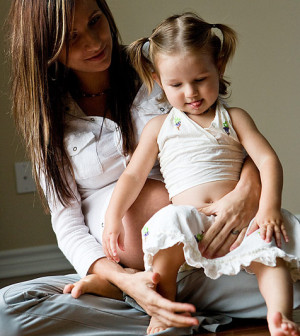- Could Your Grocery Store Meat Be Causing Recurring UTIs?
- Are You Making This Expensive Thermostat Error This Winter?
- Recognizing the Signs of Hypothyroidism
- 10 Strategies to Overcome Insomnia
- Could Artificial Sweeteners Be Aging the Brain Faster?
- Techniques for Soothing Your Nervous System
- Does the Water in Your House Smell Funny? Here’s Why
- Can a Daily Dose of Apple Cider Vinegar Actually Aid Weight Loss?
- 6 Health Beverages That Can Actually Spike Your Blood Sugar
- Treatment Options for Social Anxiety Disorder
Be Your Child’s Valentine

Valentine’s Day is two days away, and it’s a great day to show your kids a little extra loving, child health experts say.
The American Academy of Pediatrics (AAP) offers the following advice on making your kids feel special on the holiday and every day.
Be positive and encouraging when talking with your children. Avoid mockery, sarcasm and put-downs. Set a good example on how to deal with other people and use words such as “I’m sorry,” “please,” and “thank you.”
Lovingly and promptly respond to your children’s emotional and physical needs, and always be ready to listen to them. If children are in a bad mood, give them a hug or other sign of affection, and put off talking to them until they’re in a better mood.
Spend time with children doing things they enjoy and encourage them to be active by going cycling, walking or playing sports with them. Have regular family nights and turn off cellphones and other electronic devices during those times.
Make Valentine’s Day cards with preschool and school-aged children. Send your teen a valentine. No matter what their age, don’t forget to tell your kids you love them.
Don’t use violent forms of punishment. Start using both rewards and restrictions at an early age so children get used to following rules.
Start reading to children when they are 6 months old. Avoid TV for the first two years of life. When they’re older, monitor and limit their computer, video game and other screen time. Help children develop their skills and abilities by providing them with the items and instruction they need.
Teach children about healthy eating by encouraging them to prepare meals with you, from planning menus to shopping for ingredients to food preparation and serving.
Take children to the doctor regularly for preventive care, teach them how to avoid injuries, provide them with a healthy and nutritious diet, and make sure they get plenty of sleep and physical activity. Also, help them develop positive relationships with siblings, friends, neighbors and other people.
Help your children develop self-esteem by providing them with steady support and helping them discover their strengths. If you believe in your children, they will learn to believe in themselves, according to the AAP.
More information
The American Academy of Pediatrics has more on parenting.
Source: HealthDay
Copyright © 2026 HealthDay. All rights reserved.










